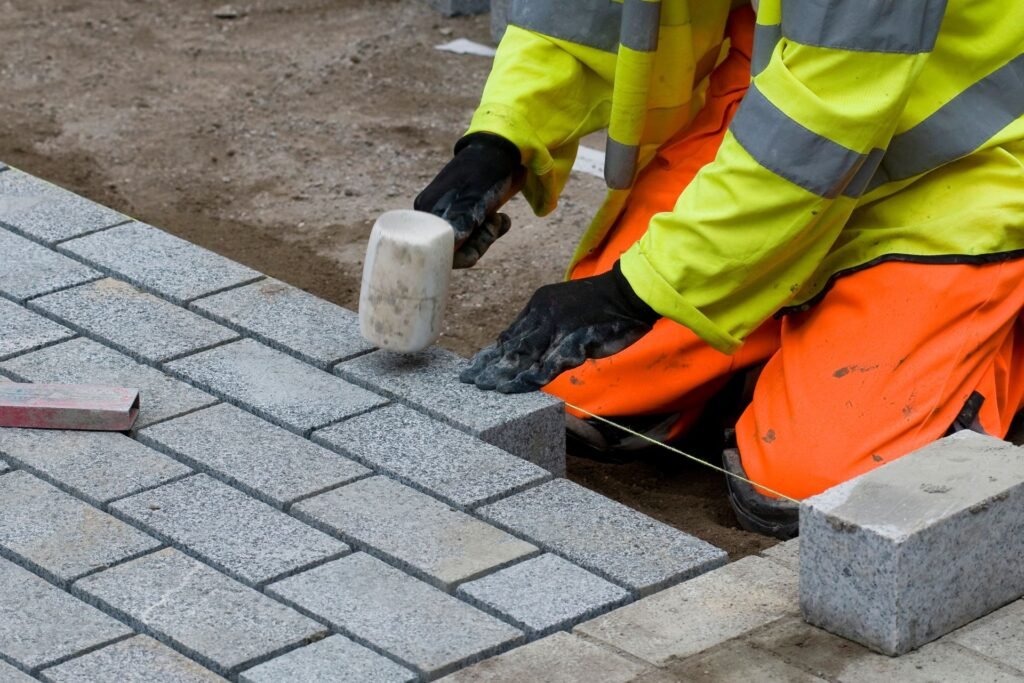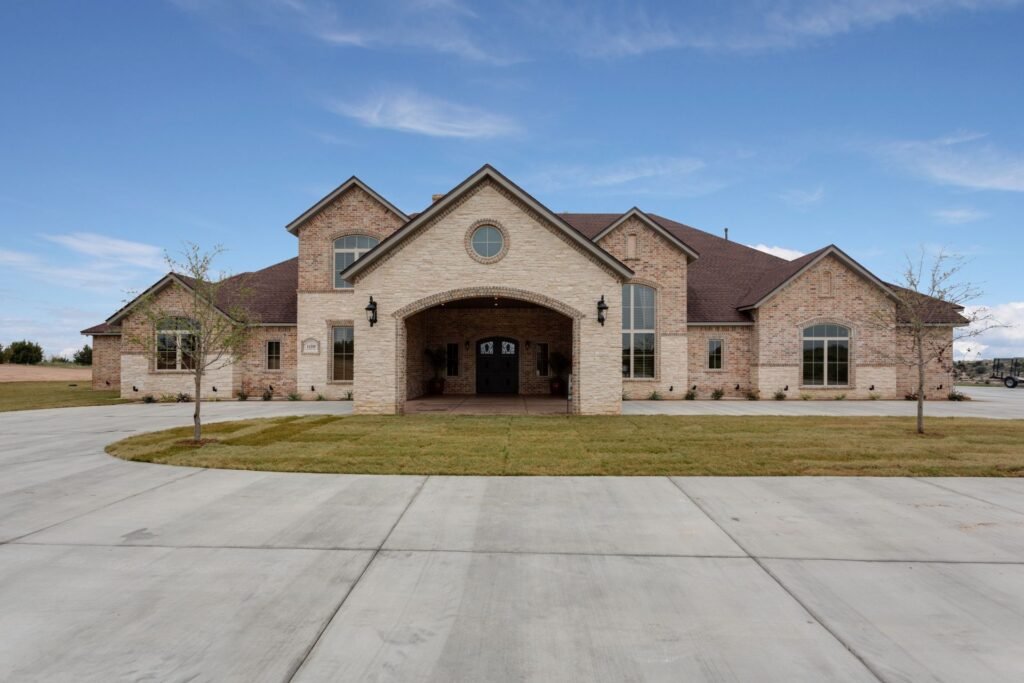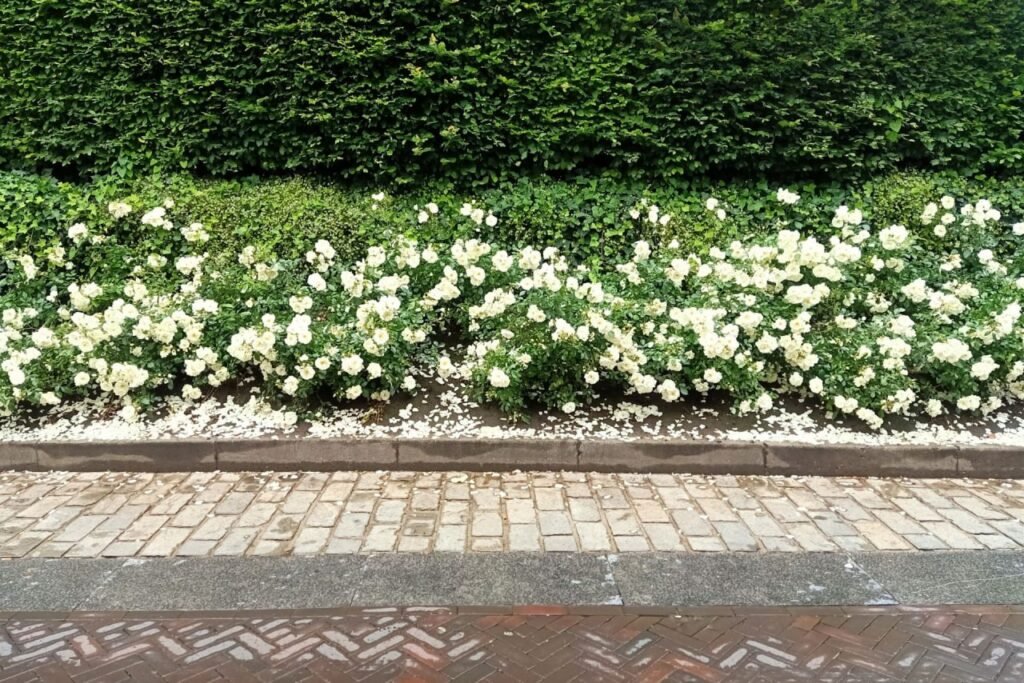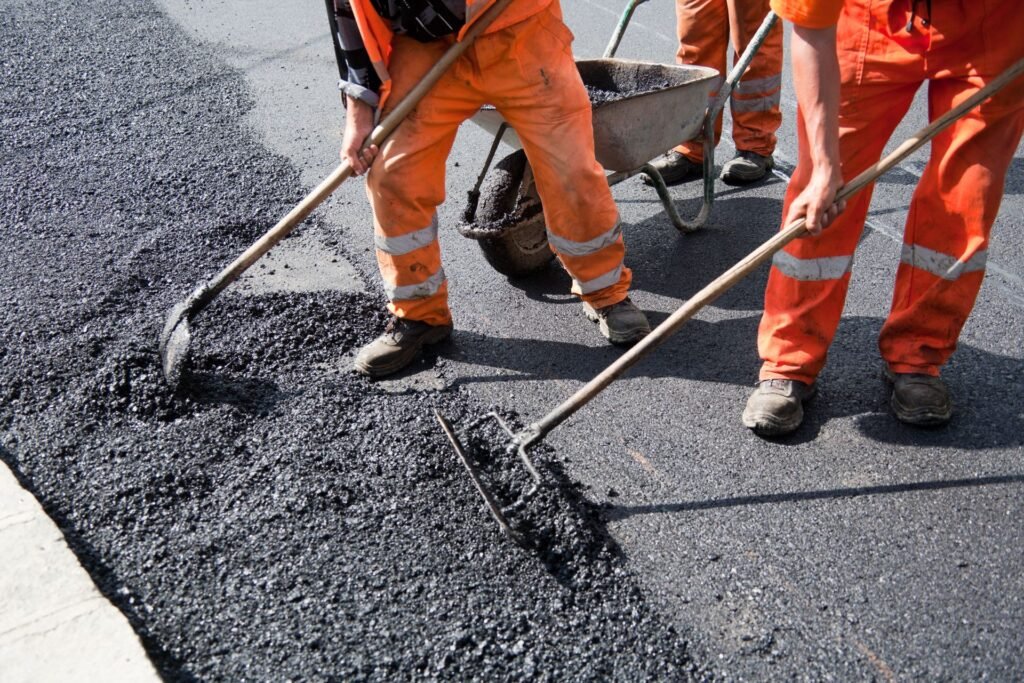Welcome to your ultimate guide to driveway ideas for New Zealand homes! Whether you’re building a new home or upgrading your current driveway, choosing the right design and material is crucial for both curb appeal and functionality. In this post, we’ll explore a variety of driveway options tailored to NZ’s unique climate and diverse landscapes, from modern concrete and sleek resin-bound surfaces to more eco-friendly permeable solutions and timeless cobblestone. No matter your budget or style preference, you’ll find inspiration here to create a driveway that not only enhances your home’s exterior but also stands up to the demands of everyday use in NZ’s weather conditions. Let’s dive into these top 10 driveway ideas that are practical, stylish, and perfect for your Kiwi home.
The best driveway ideas for NZ homes include a range of options from affordable gravel and durable concrete to eco-friendly permeable surfaces and luxurious cobblestones. Whether you’re looking for modern designs, low-maintenance solutions, or ways to boost curb appeal, these driveway ideas cater to New Zealand’s diverse landscapes and climates, offering both functionality and style.
Table of Contents
Affordable & Stylish Solution For Your Home
When it comes to choosing a driveway material, gravel stands out as one of the most affordable and stylish options available. Gravel driveways offer a perfect blend of practicality and charm, making them a popular choice for homeowners looking to enhance their property without breaking the bank.
Why Choose a Gravel Driveway
One of the primary reasons people opt for gravel driveways is the cost-effectiveness. Unlike asphalt or concrete, gravel is much cheaper to install, allowing you to get a high-quality driveway for a fraction of the cost. Additionally, the installation process is straightforward and can often be completed in a short amount of time, which means fewer labor costs. Plus, gravel comes in various colors and sizes, providing a level of versatility that complements a wide range of home styles, especially those with a natural or rustic aesthetic.
But the benefits of gravel driveways don’t stop at affordability. These driveways are also excellent for drainage, making them ideal for properties located in areas prone to heavy rain or flooding. Because water can easily flow through the gravel into the ground below, you won’t have to worry as much about water pooling or erosion issues, which can be a problem with solid-surface driveways.
The Pros of Gravel Driveways
- Cost-Effective: Gravel is one of the most affordable driveway materials available. It’s an excellent option for budget-conscious homeowners.
- Easy to Maintain: With just a bit of regular upkeep, such as raking and replenishing gravel, these driveways can last for years.
- Good for Drainage: Gravel allows water to seep through, reducing the risk of flooding or water damage around your home.
- Blends with Natural Surroundings: If you live in a rural or coastal area, or you want to maintain a natural aesthetic, gravel driveways blend beautifully with the environment.
The Cons of Gravel Driveways
While gravel driveways have many benefits, they aren’t without their downsides. Gravel can shift or get displaced over time, especially in areas with heavy traffic or harsh weather conditions. This means you may need to replenish the gravel periodically to maintain a smooth and functional surface. Additionally, gravel can sometimes get scattered outside the boundaries of your driveway, potentially creating a bit of a mess if not properly contained.
- Requires Occasional Replenishing: Over time, gravel can become compacted or scattered, meaning you’ll need to top it up occasionally.
- Potential for Displacement: Without proper edging or containment, gravel may get displaced, especially during heavy rains or frequent use.
Best Locations for Gravel Driveways
Gravel driveways work best in specific environments. They are especially well-suited for rural or coastal areas where the natural surroundings harmonize with the rustic charm of gravel. Additionally, they are a favorite for eco-conscious homeowners due to the material’s environmentally friendly qualities. Gravel is a permeable surface, meaning it allows rainwater to absorb into the ground, reducing the strain on stormwater systems and contributing to a more sustainable property.
Best For
- Rural or coastal areas
- Eco-conscious homeowners
- Properties with a natural or rustic aesthetic
Tips for Maintaining a Gravel Driveway
Gravel driveways require some routine maintenance to keep them looking their best and functioning properly. Here are a few essential tips.
- Regular Raking: One of the simplest ways to maintain a gravel driveway is by raking it regularly. This helps keep the surface even, prevents potholes, and redistributes gravel that may have shifted or displaced.
- Add New Gravel as Needed: Over time, gravel may compact or wash away. To keep your driveway looking fresh, add new gravel periodically. It’s also a good idea to rake it into place to maintain a smooth surface.
- Create Proper Edging: Installing a border or edging around the driveway can help contain the gravel, preventing it from spreading into surrounding areas. This also helps keep the overall appearance neat and tidy.
- Control Weeds: Weeds can sometimes grow through the gravel. Applying a weed barrier or herbicide can prevent unwanted plants from taking root and maintain the clean look of your driveway.
- Address Drainage Issues: If you notice water pooling in certain areas, you may need to adjust the slope of your driveway or add more gravel to improve drainage.
Gravel driveways are an excellent option for homeowners looking for an affordable, stylish, and practical driveway solution. They are easy to install, require minimal maintenance, and offer excellent drainage benefits. While they may require occasional replenishing and attention to prevent gravel displacement, the long-term cost savings and aesthetic appeal make them a top choice for many. Whether you live in a rural, coastal, or suburban area, a gravel driveway can enhance the natural beauty of your property while offering a functional and eco-friendly solution.

Durable & Low Maintenance
When it comes to choosing a material for your driveway, concrete stands out for its remarkable durability and low maintenance needs. Concrete driveways have long been favored by homeowners for their ability to withstand the test of time, even under heavy use. Whether you’re parking multiple vehicles or dealing with constant foot traffic, concrete offers a robust surface that can handle the load.
One of the most attractive features of a concrete driveway is its versatility in design. It’s not just a plain gray slab anymore. You can opt for different finishes to complement the style of your home. Smooth concrete gives a clean, polished look, while brushed finishes add texture and grip, making them ideal for areas prone to rain or snow. For those looking to add a personal touch, colored concrete can brighten up your outdoor space, and stamped designs can replicate the look of more expensive materials like stone, brick, or even tile. These customization options allow you to blend functionality with curb appeal seamlessly.
Pros of Concrete Driveways
- Long-Lasting: Concrete driveways can last decades when properly installed and maintained, making them a solid long-term investment.
- Low Maintenance: Unlike other materials, concrete doesn’t require regular sealing, resurfacing, or extensive cleaning. A simple wash now and then is usually enough to keep it looking great.
- Customizable: You can choose from a wide range of colors, patterns, and textures to match your home’s design or to create a unique look that stands out.
Cons of Concrete Driveways
- Higher Upfront Cost: While concrete driveways are an investment that pays off over time, the initial installation costs tend to be higher compared to materials like asphalt or gravel.
- Susceptible to Cracking: In regions with significant temperature fluctuations, concrete can be prone to cracking over time. However, proper installation and sealing can minimize this risk.
Best For
Concrete driveways are ideal for urban homes with modern designs, especially in areas where high traffic is expected. They pair well with contemporary architecture and are perfect for homeowners who want a stylish yet practical solution.
Design Tip
To elevate the aesthetic appeal of your concrete driveway, explore finishes that mimic high-end materials like stone or tile. This way, you can enjoy the durability of concrete while achieving the luxurious look of natural stone without the hefty price tag. Incorporating these textures can create a driveway that complements your home’s exterior design, enhancing the overall curb appeal.
By choosing a concrete driveway, you’re opting for a material that offers a perfect blend of durability, low maintenance, and customizable beauty. Whether you want a sleek modern look or something more textured and decorative, concrete can deliver both practicality and style.

Classic Elegance With Endless Design Options
When it comes to adding timeless appeal to your driveway, few options rival the beauty and flexibility of pavers. With their wide range of colors, shapes, and patterns, paver driveways can transform the exterior of any home, offering an instant boost in curb appeal and creating a sense of luxury. Whether you’re looking to achieve a classic, elegant look or something more modern and unique, paver driveways offer endless design possibilities to fit any style.
Why Pavers are a Top Choice for Driveways
Pavers provide homeowners with incredible flexibility when it comes to design. Whether you prefer the warm, earthy tones of natural stone or the sleek, modern appearance of brick, there’s a paver option to suit every taste. With the ability to mix and match colors and patterns, you can create a driveway that is not only functional but also a beautiful reflection of your personal style. Popular patterns like herringbone and basket weave offer a classic appeal, while more contemporary designs can be achieved with large format pavers or permeable options, which are perfect for coastal homes, especially those influenced by the relaxed yet stylish vibes often seen in New Zealand’s coastal communities.
Pros of Paver Driveways
One of the greatest advantages of paver driveways is their aesthetic appeal. Pavers provide a polished and luxurious look that immediately enhances the appearance of your home. Beyond looks, they also offer exceptional durability. Pavers are designed to handle heavy loads and can stand up to the rigors of daily wear and tear. Because pavers are installed individually, they are easy to repair if one becomes cracked or damaged, you can replace it without disrupting the entire driveway.
Another significant benefit is customization. Pavers come in a wide variety of shapes, colors, and materials, giving you the freedom to create a driveway that’s truly one-of-a-kind. Whether you opt for natural stone, brick, or permeable pavers, the ability to design and adapt to the style of your home is unmatched.
Cons of Paver Driveways
While paver driveways offer many advantages, they do come with a few considerations. The initial installation cost can be higher compared to other driveway materials like concrete or asphalt. However, this investment often pays off in the long term, as pavers are durable and long-lasting, requiring fewer repairs overall.
Additionally, because pavers are laid individually, weeds can occasionally grow in the gaps between them. While this is not a major issue, it may require some routine maintenance in terms of weed control to keep your driveway looking its best.
Best For
Paver driveways are an excellent choice for homeowners who are focused on boosting curb appeal with a high-end, luxurious finish. They’re particularly well-suited for coastal homes, where the combination of durability and style is crucial. Pavers can handle the salty air and fluctuating weather conditions common in coastal environments, making them a practical yet stylish option. In New Zealand, for instance, many coastal homes take inspiration from the natural surroundings, with earthy tones and textures that blend seamlessly with the landscape.
Design Ideas for Paver Driveways
When planning a paver driveway, the design possibilities are nearly limitless. Some popular patterns to consider include.
- Herringbone: This classic pattern creates a sense of movement and sophistication. It’s also incredibly durable, making it a great option for driveways that see a lot of use.
- Basket Weave: A timeless pattern that works well with both traditional and modern homes. The alternating pattern adds depth and visual interest to your driveway.
- Large Format Pavers: For a more contemporary look, consider larger pavers in neutral tones. These are perfect for minimalist designs and pair well with modern architecture.
- Permeable Pavers: An environmentally friendly option, permeable pavers allow water to seep through, reducing runoff and providing excellent drainage. This makes them ideal for coastal homes or areas with heavy rainfall.
In terms of materials, stone pavers offer a natural, organic look, while brick pavers bring warmth and a touch of nostalgia. You can even mix materials to create contrast and unique patterns.
Paver driveways are a fantastic investment for homeowners who want to combine elegance with durability. The flexibility in design and material options ensures that you can create a driveway that complements your home’s aesthetic while standing up to the elements. While the installation may come with a higher price tag, the long-term benefits, including easy maintenance and high customization, make paver driveways a smart, stylish choice for enhancing your home’s exterior.

A Smooth And Practical Option For Your Home
When it comes to choosing the best material for your driveway, asphalt is a popular option that offers a great balance between cost, durability, and performance. If you’re considering a long driveway for a large property, or if you live in a region with colder climates, like many parts of New Zealand, asphalt could be the ideal solution. Let’s dive into why asphalt driveways are a smart choice and what you should consider before making your decision.
Why Choose Asphalt for Your Driveway
Asphalt is often chosen for its smooth surface and cost-effectiveness. It’s a durable option that can last for many years with proper maintenance, and it’s usually much less expensive than concrete. This makes it especially appealing for longer driveways, where the costs can quickly add up. In colder regions, asphalt also offers a key advantage: its flexibility. Asphalt can expand and contract with changing temperatures, meaning it’s less likely to crack in response to the freeze-thaw cycles typical of New Zealand’s chillier areas.
Pros of Asphalt Driveways
- Quick Installation: One of the best things about asphalt is how fast it can be installed. Depending on the size of your driveway, it may only take a few days to complete the entire project, which is much quicker than installing a concrete driveway.
- Smooth, Even Surface: Asphalt provides a smooth driving surface, which makes it more comfortable for vehicles and reduces the wear and tear on your tires. Its even surface also minimizes the chances of puddles forming, improving drainage.
- Lower Cost: Compared to concrete, asphalt driveways are more affordable. If you’re working with a budget, especially for a longer driveway, this can make a big difference in overall project costs.
- Flexible in Cold Weather: Asphalt’s ability to flex with temperature changes helps it withstand colder weather without cracking as easily as concrete might. This makes it particularly suited to New Zealand’s colder regions.
Cons of Asphalt Driveways
- Requires Periodic Sealing: While asphalt is durable, it does require regular maintenance. You’ll need to reseal the driveway every few years to maintain its surface and prevent it from deteriorating too quickly. If you skip this step, cracks can form, leading to expensive repairs down the line.
- Limited Design Options: Asphalt driveways typically come in one color: black. If you’re looking for more decorative options, such as stamped patterns or colored finishes, asphalt might not be the best choice. For homeowners focused on curb appeal, concrete or pavers offer more variety in terms of style.
- Can Get Hot in Summer: Asphalt absorbs heat from the sun, which can make it very hot to the touch during the summer months. If you’re planning to use the driveway for outdoor activities, like children playing or walking barefoot, the heat could be a drawback.
Best Suited For
Asphalt driveways are ideal for large properties where a long, durable surface is needed at a reasonable cost. They are also a smart choice for homes located in colder climates, particularly in New Zealand’s colder regions. Asphalt’s ability to handle temperature fluctuations makes it a practical choice for areas that experience harsh winters.
Maintenance Advice for Asphalt Driveways
To ensure your asphalt driveway remains in good condition for many years, regular maintenance is crucial. One of the most important tasks is sealing. Asphalt should be sealed every few years to protect it from the elements, prevent water from seeping into cracks, and maintain its smooth surface. This also helps prevent oxidation, which can cause the asphalt to become brittle and more prone to cracking.
In addition to sealing, it’s important to keep an eye out for small cracks. Over time, minor cracks can develop due to temperature changes or regular wear and tear. It’s best to address these cracks as soon as they appear by filling them with a crack filler. This simple task can prevent larger problems down the road and help extend the lifespan of your driveway.
An asphalt driveway is a smart, practical option, particularly for homeowners with large properties or those in colder climates. Its affordability, quick installation, and ability to withstand temperature fluctuations make it a top contender for many. However, don’t forget about the need for ongoing maintenance, such as sealing and crack repairs, to ensure your asphalt driveway remains in top condition for years to come. If you’re looking for a driveway solution that combines functionality with value, asphalt could be the perfect choice for you.
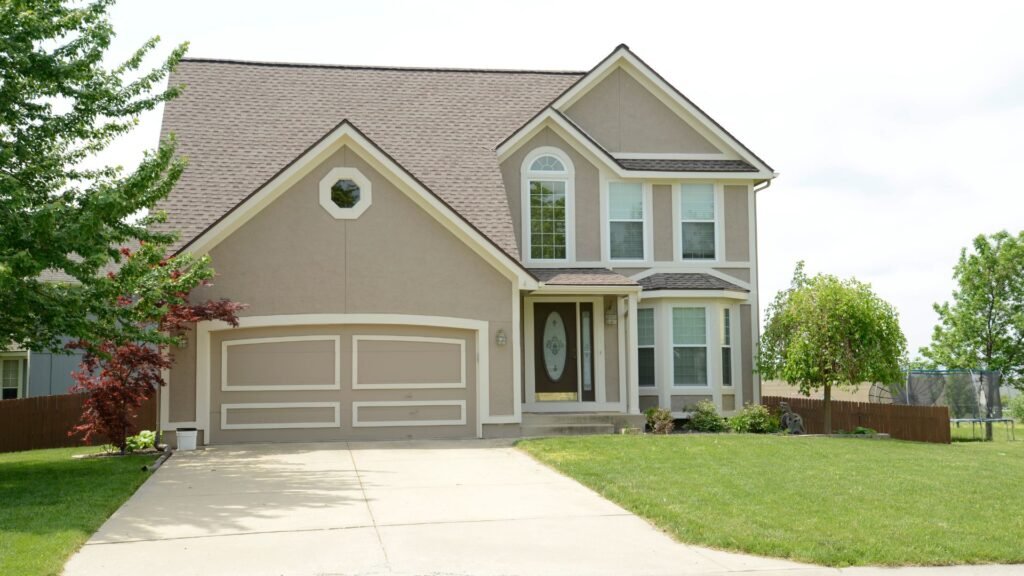
A Contemporary And Sustainable Solution
In recent years, resin-bound driveways have emerged as a popular choice for homeowners seeking a modern, eco-friendly, and visually appealing option for their outdoor spaces. This innovative surfacing solution offers a smooth, seamless finish that combines functionality with a sleek, contemporary look. Let’s dive into why resin-bound driveways are becoming a top choice for many, including their benefits, potential drawbacks, and ideal applications.
What Are Resin-Bound Driveways
A resin-bound driveway is created by mixing clear resin with natural aggregates like gravel, quartz, or recycled glass. This mixture is then laid over a prepared base, resulting in a durable, permeable surface that allows water to drain through, reducing the risk of flooding and puddling. This type of driveway not only enhances the aesthetic appeal of your home but also provides an eco-friendly alternative to traditional asphalt or concrete surfaces.
Benefits of Resin-Bound Driveways
- Permeability and Drainage: One of the standout features of resin-bound driveways is their permeability. This makes them a fantastic option for areas prone to heavy rainfall or flooding. The porous surface allows water to filter through the material, preventing water buildup and promoting better drainage. This is particularly important in regions with variable weather patterns, such as New Zealand, where sudden downpours are not uncommon.
- Customizable Design: Resin-bound driveways offer virtually limitless design possibilities. By combining different aggregates, homeowners can create bespoke colors and textures that perfectly complement their home’s exterior. Whether you prefer a natural stone look or a more vibrant, artistic finish, the customization options make resin-bound driveways ideal for those who want to enhance their curb appeal with a unique touch.
- Low Maintenance: Unlike traditional driveway surfaces that may require regular sealing, repairs, or weeding, resin-bound driveways are remarkably low maintenance. The smooth surface prevents weed growth, and occasional power washing is usually enough to keep the driveway looking fresh and clean. Their durability also means fewer repairs and replacements over time, making them a cost-effective option in the long run.
- Long-Lasting Durability: When installed correctly by professionals, resin-bound driveways are extremely resilient and can last for years without showing signs of wear and tear. They are resistant to UV rays, which means the color won’t fade over time, and they can withstand the weight of vehicles without cracking or sinking.
Potential Drawbacks of Resin-Bound Driveways
- Cost: While resin-bound driveways offer many advantages, they can be more expensive upfront compared to traditional driveway materials like gravel or asphalt. However, the long-term benefits, including reduced maintenance and longer lifespan, can make the initial investment worthwhile for many homeowners.
- Professional Installation Required: Resin-bound driveways are not a DIY project. They require skilled professionals to ensure the correct mixture of resin and aggregate and to apply it evenly for a seamless finish. Poor installation can lead to problems like pooling water or an uneven surface, so it’s essential to hire experienced contractors for the job.
Ideal Applications for Resin-Bound Driveways
Resin-bound driveways are particularly well-suited for.
- Contemporary Homes: Their sleek, smooth finish complements modern architectural styles, adding a clean, polished look to any property.
- Eco-Conscious Homeowners: With their permeable surface and use of natural or recycled aggregates, resin-bound driveways are an environmentally friendly option for those looking to reduce their environmental footprint.
- Rain-Prone Areas: As mentioned earlier, their excellent drainage properties make them a smart choice for areas that experience frequent rainfall or are prone to flooding, like certain regions of New Zealand.
Unique Colors and Finishes
One of the most exciting aspects of resin-bound driveways is the ability to mix different aggregates to achieve a completely unique look. The combination of resin with various stones or recycled materials allows for a wide range of colors, from earthy tones to more vibrant hues. This customization offers homeowners the chance to create a driveway that stands out and enhances the overall aesthetic of their property. Whether you prefer a subtle, natural stone effect or a bold, eye-catching pattern, resin-bound driveways can be tailored to match your personal style and the character of your home.
Resin-bound driveways are a contemporary and sustainable solution that offer both form and function. While they may come with a higher upfront cost and require professional installation, their long-term benefits, including durability, low maintenance, and stunning visual appeal, make them a worthwhile investment. Perfect for modern homes, eco-conscious individuals, and areas with heavy rainfall, resin-bound driveways are a smart choice for those looking to enhance their outdoor spaces with a durable, attractive, and environmentally friendly surface.
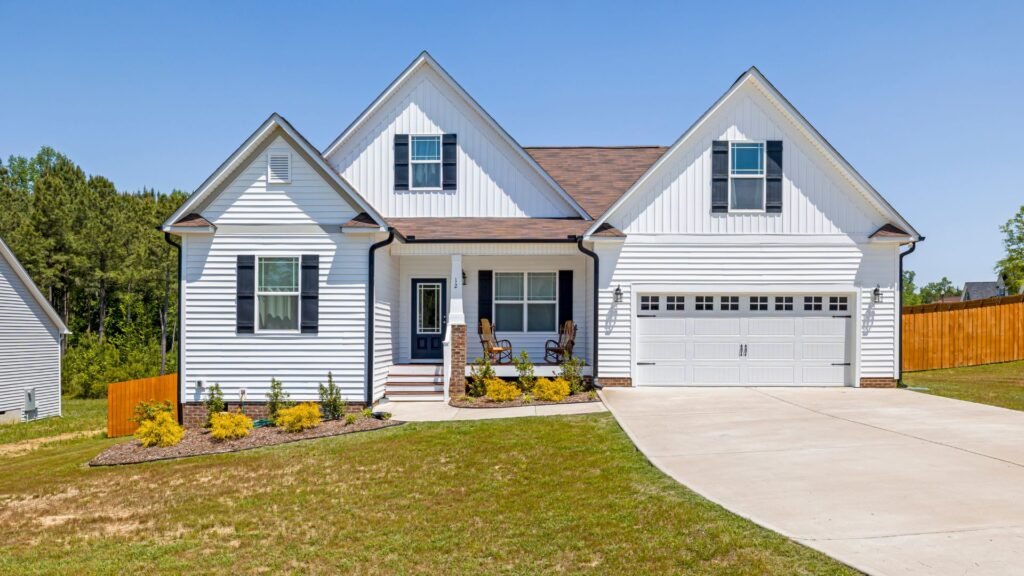
Timeless Charm For Your Home
Cobblestone driveways bring an unmistakable touch of elegance and charm to any home. Known for their timeless appeal, cobblestones have been a symbol of luxury and sophistication for centuries. Whether you’re restoring a heritage home or want to add a classic, high-end look to your property, cobblestones offer an aesthetic that is both distinctive and enduring.
Why Choose Cobblestone Driveways
Cobblestones are a traditional option that never goes out of style. The natural stone patterns can instantly elevate the appearance of your home, making it stand out in the neighborhood. Cobblestones add significant curb appeal, especially in regions with historical significance like New Zealand, where homes are often built to reflect the natural landscape or architectural history. Driveways made from cobblestones look particularly striking in rural or coastal areas, evoking an old-world charm that complements both modern and heritage homes alike.
The Pros of Cobblestone Driveways
- Durability: Cobblestone driveways are known for their strength and durability. This makes them an ideal long-term investment, as they can withstand heavy traffic and adverse weather conditions without wearing down. Cobblestones have been used for centuries in some of the world’s oldest cities and roads testament to their impressive longevity.
- Distinctive Appearance: There’s no mistaking the classic beauty of cobblestone driveways. The natural, irregular patterns and the unique textures of the stones give each driveway a one-of-a-kind look. It’s a surefire way to create a grand entrance and significantly enhance your home’s curb appeal.
- Adds Property Value: Choosing cobblestones can also increase the value of your property. The high-end look and feel associated with this type of driveway add a luxurious touch that potential buyers will appreciate, making your home stand out in the real estate market.
The Cons of Cobblestone Driveways
- Higher Cost: While the elegance and durability of cobblestones are unmatched, they do come at a higher price point compared to other materials like asphalt or concrete. Installation can be labor-intensive, and the stones themselves are premium materials, which drives up the cost. However, for many homeowners, the investment is worth it for the unique charm and longevity cobblestones provide.
- Uneven Surface: Cobblestones, by nature, have an uneven surface. This can sometimes pose challenges for both vehicles and pedestrians. Cars may experience a slightly bumpy ride, and it may be more difficult for individuals to walk on in heels or for those with mobility issues. Despite this, many homeowners find that these slight inconveniences are easily outweighed by the aesthetic appeal.
Best For
Cobblestone driveways are particularly well-suited for heritage homes, especially in areas of New Zealand with historical significance. If your home is located in a coastal or rural area, cobblestones can enhance the natural beauty of your surroundings, blending seamlessly with stone walls, gardens, or rustic architectural elements. They’re also perfect for homes that want to create a sense of nostalgia or old-world charm, evoking the feeling of walking down a centuries-old street in Europe.
Design Tip
To further enhance the beauty of your cobblestone driveway, consider pairing it with complementary stone landscaping features. This could include stone walls, garden beds bordered with rocks, or even stone pathways that lead up to your front door. These elements will create a cohesive look that amplifies the natural beauty of the cobblestone and ties together your outdoor space for a truly stunning entrance.
Cobblestone driveways offer a combination of timeless charm, durability, and value that few other materials can match. While the initial investment may be higher, the distinctive aesthetic and long-lasting quality make it a smart choice for homeowners looking to make a lasting impression. Whether you’re restoring a heritage property or simply want to add a touch of elegance to your home, a cobblestone driveway is a choice that will stand the test of time.

A Smart, Eco-Friendly Solution
In recent years, permeable driveways have gained attention as both a practical and environmentally conscious alternative to traditional driveways. They are designed to allow water to drain directly through the surface rather than pooling or running off into storm drains, which helps reduce flooding, manage water runoff, and support the local ecosystem.
What Are Permeable Driveways
Permeable driveways are constructed using materials that allow water to pass through the surface, into the ground below. This prevents excess water from contributing to runoff, which is often a cause of local flooding and water pollution. Unlike standard asphalt or concrete driveways, permeable driveways allow rainwater to naturally infiltrate the soil. This mimics the natural water cycle and is particularly beneficial in urban areas where impermeable surfaces dominate.
Key Benefits of Permeable Driveways
- Environmentally Friendly: One of the biggest advantages of permeable driveways is their positive impact on the environment. By reducing runoff, they minimize the risk of floods and help recharge groundwater supplies. This is especially crucial in areas prone to heavy rainfall or flash flooding. Additionally, they help to filter out pollutants from the water before it reenters the soil, improving local water quality.
- Improved Drainage: In homes located in areas with significant rainfall, drainage can be a major concern. A permeable driveway helps prevent water from accumulating on the surface and directs it into the soil. This can be particularly helpful for homeowners dealing with soggy yards, pooling water, or potential damage to foundations caused by water buildup.
- Sustainable Urban Design: Many cities and suburban areas are adopting permeable solutions as part of their sustainable development plans. Permeable driveways reduce the pressure on local stormwater systems and mitigate the urban heat island effect by allowing for cooler surface temperatures.
Drawbacks to Consider
While permeable driveways offer many benefits, they aren’t without their challenges.
- Higher Installation Costs: The upfront cost of a permeable driveway can be higher than traditional paving options. This is due to the specialized materials and additional groundwork required to ensure proper drainage and long-term performance. However, the long-term benefits, including potential savings on drainage solutions and reduced environmental impact, often offset this initial investment.
- Weed Control and Maintenance: Depending on the material used, weeds may grow between the spaces, particularly in permeable pavers or gravel driveways. Regular maintenance is needed to keep the driveway looking its best, which might include weed control and occasional power washing.
Best Applications for Permeable Driveways
Permeable driveways are ideal for:
- Homes in Rainy Areas: If you live in a region that experiences heavy or frequent rainfall, a permeable driveway can help manage water on your property and prevent issues like soil erosion or basement flooding.
- Eco-Conscious Homeowners: Those who are looking to reduce their environmental footprint and adopt more sustainable home improvements will appreciate the benefits of permeable driveways.
Popular Permeable Driveway Materials
There are several materials to choose from when designing a permeable driveway, each with its own set of advantages.
- Permeable Pavers: These are specially designed paving stones with small gaps between them, allowing water to pass through. They come in various styles, from modern to rustic, and can be customized to suit the look of your home.
- Gravel: Gravel driveways are a cost-effective permeable option. Water easily flows through the loose gravel, and it’s relatively simple to install. However, gravel may require occasional replenishing and regular leveling to maintain its functionality and appearance.
- Resin-Bound Driveways: A resin-bound surface combines natural aggregates with resin to create a smooth, permeable surface. This type of driveway is durable, low-maintenance, and offers a modern, polished look. It’s a more premium option but provides excellent drainage and long-lasting performance.
Permeable driveways are an excellent investment for homeowners looking to enhance the sustainability and functionality of their outdoor spaces. By reducing water runoff, they help prevent flooding and support natural water cycles. While the initial cost may be higher and some maintenance is required, the long-term benefits both environmentally and practically make permeable driveways a smart choice, especially in areas with heavy rainfall or eco-conscious communities. Whether you choose permeable pavers, gravel, or resin-bound options, incorporating a permeable driveway into your property can improve drainage, reduce your environmental impact, and add aesthetic value to your home.
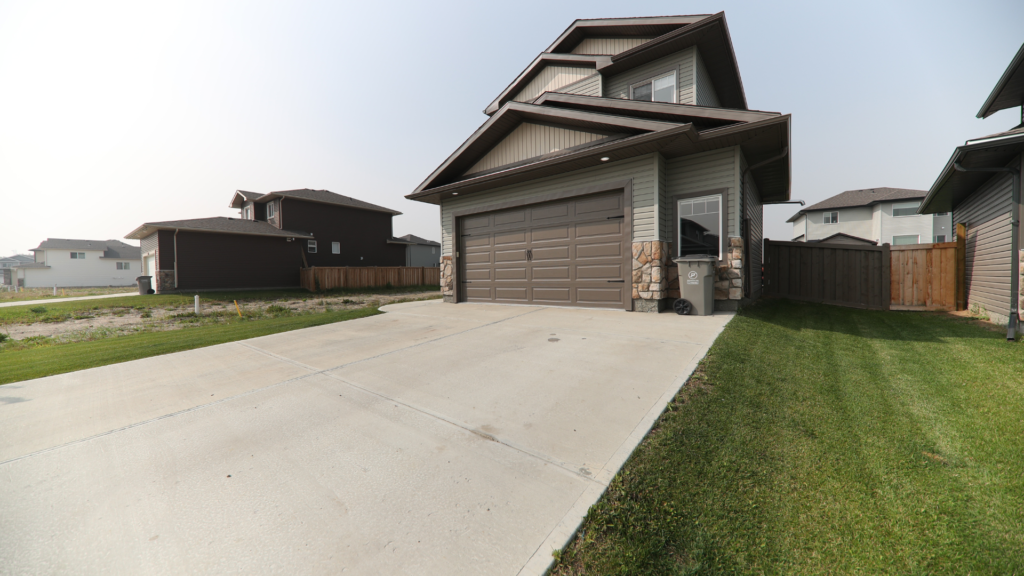
A Perfect Blend Of Durability And Aesthetic Appeal
Stamped concrete is a popular choice for homeowners looking to elevate their outdoor spaces with a stylish, custom look that doesn’t break the bank. This decorative concrete solution mimics the appearance of high-end materials like natural stone, brick, and slate, offering a sophisticated look at a fraction of the cost. Ideal for driveways, patios, walkways, and even interior floors, stamped concrete provides the charm of traditional materials with the durability and ease of concrete.
What is Stamped Concrete
Stamped concrete involves pouring fresh concrete and imprinting it with a pattern or texture before it dries. The result is a surface that can closely resemble more expensive materials such as cobblestone, flagstone, brick, or wood planks. It’s also highly customizable, with a wide range of patterns and colors available to suit various architectural styles.
Benefits of Stamped Concrete
- Affordable Luxury: One of the primary reasons people choose stamped concrete is its cost-effectiveness. While natural stone or brick installations can be quite expensive, stamped concrete provides a similar look for much less, making it an ideal solution for budget-conscious homeowners seeking a high-end appearance.
- Highly Customizable: With stamped concrete, you have the freedom to choose from numerous patterns and colors to create a unique design that matches your home’s style. Whether you’re aiming for a rustic cobblestone driveway, a sleek slate patio, or a decorative brick walkway, stamped concrete offers endless customization options.
- Durability: Stamped concrete is incredibly durable and can withstand heavy foot traffic, making it a great option for high-use areas. When properly installed and maintained, stamped concrete can last for decades without needing major repairs, which makes it an excellent investment for your home.
Drawbacks of Stamped Concrete
While stamped concrete is a fantastic option for many homes, there are a few potential downsides to keep in mind.
- Susceptibility to Cracking: Like any concrete surface, stamped concrete can crack over time, particularly in regions with extreme temperature fluctuations. Freezing and thawing cycles can cause the concrete to expand and contract, leading to cracks. However, proper installation and control joints can help minimize the risk.
- Requires Sealing: To maintain its appearance and longevity, stamped concrete requires regular sealing. Sealing protects the surface from moisture, prevents staining, and enhances its color. While this is a necessary step in maintaining stamped concrete, it’s an added maintenance task to consider.
Ideal Applications for Stamped Concrete
Stamped concrete works well in a variety of home styles, making it a versatile choice for different types of properties. Whether your home is modern, traditional, or a blend of the two, stamped concrete can complement its aesthetic while providing a durable and functional surface.
- Modern Homes: Stamped concrete can be designed to resemble sleek materials like slate or polished stone, providing a clean, minimalistic look that pairs well with contemporary architecture.
- Traditional Homes: For properties with more classic architecture, stamped concrete can mimic the appearance of brick or cobblestone, adding charm and character that blends seamlessly with traditional designs.
Patterns and Styles for NZ Homes
When it comes to stamped concrete, the design possibilities are nearly endless. Here are a few popular patterns and ideas for blending them with New Zealand’s architectural styles.
- Cobblestone Patterns: This classic design works beautifully with traditional homes or properties in heritage areas. Cobblestone patterns evoke a sense of old-world charm and can be particularly appealing in driveways or walkways.
- Wood Plank Stamps: If you want the look of wooden decking without the maintenance, wood plank stamped concrete is a great alternative. This design pairs well with both modern and traditional homes, offering a warm, natural look that complements outdoor spaces.
- Flagstone and Slate Patterns: For a more natural, organic appearance, consider flagstone or slate-inspired stamped concrete. These patterns are perfect for patios and pool surrounds, giving your outdoor space a high-end, custom look.
- Brick Impressions: For homes with a more classic or colonial style, brick-impressed stamped concrete adds a timeless touch. Use this pattern for walkways or garden paths to create a cozy, welcoming vibe.
Stamped concrete offers a cost-effective way to add beauty, customization, and durability to your home. Whether you’re looking to enhance your driveway, patio, or interior spaces, stamped concrete provides a wide range of design options that can fit seamlessly into any style of home. While it does require some maintenance, its longevity and aesthetic appeal make it a worthwhile investment for homeowners looking to elevate their property’s curb appeal without splurging on expensive natural materials. If you want a custom look that aligns with New Zealand’s diverse architectural styles be it modern, traditional, or somewhere in between stamped concrete is a versatile and durable option to consider.

Grass Pavers And Reinforced Turf
A green driveway, also known as a grass paver or reinforced turf driveway, is an eco-friendly alternative to traditional concrete or asphalt surfaces. This sustainable option utilizes a grid system typically made from plastic, concrete, or recycled materials that reinforces the ground while allowing grass to grow through. As a result, the driveway blends seamlessly into the surrounding landscape, providing a natural aesthetic that’s both practical and environmentally conscious.
Benefits of Grass Pavers and Reinforced Turf Driveways
Natural Look
One of the most attractive features of a green driveway is its natural, organic appearance. Rather than having a harsh, solid surface, this option integrates your driveway with your lawn or garden, creating a cohesive and aesthetically pleasing outdoor space. This can greatly enhance curb appeal, especially for homes that emphasize natural beauty or rural landscapes.
Environmentally Friendly
Grass pavers are a great way to reduce your carbon footprint. By using permeable materials, these driveways support proper water drainage and prevent runoff, which helps reduce flooding risks and erosion. Additionally, grass absorbs carbon dioxide and releases oxygen, contributing to a healthier atmosphere around your home.
Improved Drainage
Unlike traditional driveways, which can contribute to water pooling or excessive runoff during heavy rains, green driveways offer excellent water permeability. The grid system allows rainwater to pass through, filtering into the soil and promoting groundwater replenishment. This can help reduce strain on local stormwater systems and minimize the risk of water-related damage to your property.
Drawbacks of Green Driveways
Regular Mowing Required
While green driveways have many advantages, they do require regular maintenance, particularly mowing. To keep the grass healthy and aesthetically pleasing, you’ll need to maintain a regular mowing schedule. This ensures the grass doesn’t grow too tall, which could potentially obscure the grid system or make the driveway look unkempt.
Not Suitable for Heavy Traffic Areas
Grass pavers are ideal for residential use but may not be the best choice for areas with heavy vehicle traffic. While the reinforced grid provides stability, the grass may wear down more quickly if exposed to constant use or weight from large vehicles. This makes green driveways better suited for rural properties, large estates, or homes where the driveway is used less frequently.
Large Rural Properties and Eco-Conscious Homeowners
Green driveways are an excellent fit for those who prioritize environmental sustainability and aesthetics. They are particularly well-suited for large rural properties where natural landscaping is a primary focus. Homeowners who are eco-conscious and prefer alternatives to traditional, impervious surfaces will appreciate the green driveway’s environmental benefits and natural appearance.
Maintenance Tips for Green Driveways
To keep your grass paver or reinforced turf driveway looking great and functioning effectively, regular maintenance is essential. Here are some tips to ensure the grass remains healthy and the driveway stays in top shape.
- Mowing: Regular mowing is crucial to maintaining the appearance and health of the grass. Keep the grass at a manageable height to avoid it getting too long, which could obscure the grid system or interfere with the driveway’s function. Aim to mow at least once every one to two weeks, depending on the growth rate.
- Watering: Like any lawn, your green driveway will need sufficient water, especially during dry spells. Set up an irrigation system if you live in an area prone to drought or extended periods without rain. However, avoid overwatering as this can lead to soggy patches or promote weed growth.
- Fertilizing: Apply organic fertilizer to keep the grass lush and green. Use a slow-release fertilizer in the spring to give the grass a nutrient boost, and reapply as needed throughout the growing season. Be sure to follow the manufacturer’s instructions to prevent over-fertilizing, which can damage the grass or lead to excessive growth.
- Weed Control: Weeds can occasionally appear in your green driveway, especially if the grass isn’t thriving. Use eco-friendly weed control methods such as hand-pulling or applying natural herbicides. Avoid harsh chemicals that could harm the grass or the surrounding ecosystem.
- Aeration and Reseeding: Over time, the soil beneath the grid system may become compacted, hindering water absorption and grass health. Periodically aerate the soil to promote root growth and proper drainage. If you notice bare spots or thinning areas in your driveway, consider reseeding those sections to maintain a uniform, healthy lawn.
Green driveways are a beautiful, sustainable option that can add both visual appeal and eco-friendliness to your home. While they require some maintenance and aren’t suitable for every situation, they are ideal for homeowners looking to embrace a natural aesthetic and reduce their environmental impact.
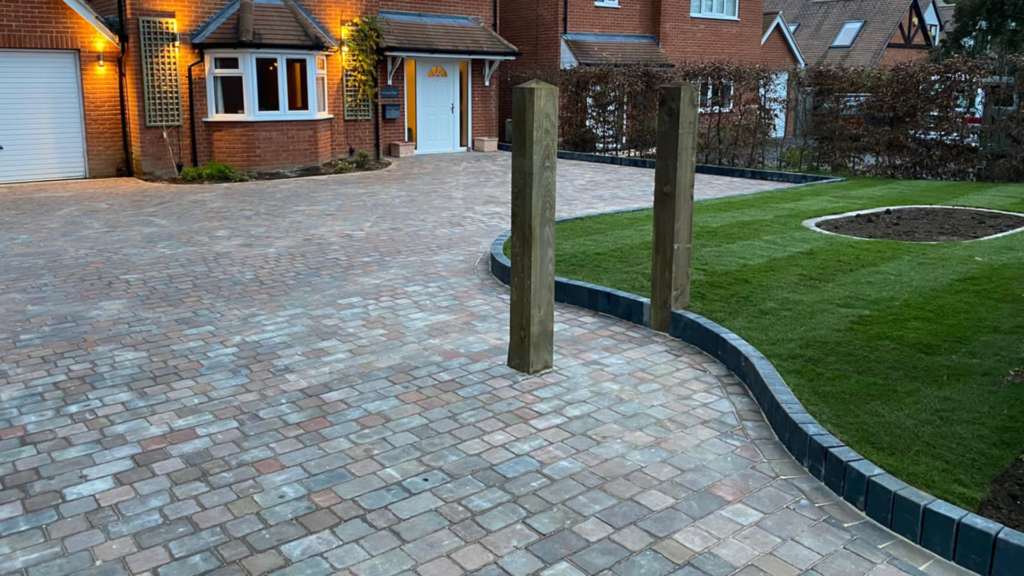
A Creative And Unique Approach
In the world of driveway design, mixed-material driveways are quickly gaining popularity among homeowners who want to elevate the curb appeal of their property. These driveways combine different materials like concrete, pavers, gravel, and cobblestone to create a surface that is not only functional but also visually appealing. The idea is to merge various textures, colors, and patterns to craft a driveway that feels both artistic and personalized.
Why Choose a Mixed-Material Driveway
A mixed-material driveway gives you a wide range of design possibilities, making it a perfect option for those who want to move beyond the standard concrete or asphalt look. The versatility it offers means that you can tailor your driveway to match the architectural style of your home and the surrounding landscape. By blending materials like gravel and cobblestone or concrete and pavers, you can create a unique aesthetic that sets your home apart while also addressing specific functional needs, such as improving drainage or preventing erosion.
Pros of Mixed-Material Driveways
- Design Flexibility: One of the biggest advantages of mixed-material driveways is the limitless design potential. You can experiment with different combinations of materials to create a pattern or texture that complements your home’s exterior. This customization allows for a truly personalized design that enhances your property’s overall look.
- Practicality Meets Style: Beyond aesthetics, mixed-material driveways can be engineered to solve practical issues. For instance, incorporating permeable materials like gravel can improve drainage, helping to manage stormwater runoff. This feature is especially important in regions that experience heavy rainfall or have strict water management regulations.
- Durability: Mixing durable materials like concrete or cobblestone can help extend the lifespan of your driveway. Each material can be strategically placed in high-traffic areas or areas that are more prone to wear and tear, offering a longer-lasting solution.
Cons of Mixed-Material Driveways
- Complex Installation: While the outcome is stunning, creating a mixed-material driveway is more complex than installing a single-material driveway. The process involves blending different materials in a way that ensures both visual harmony and functional durability. This complexity often requires professional expertise, which can increase the overall cost of the project.
- Higher Cost: The customization and labor involved in creating a mixed-material driveway can make it more expensive than simpler driveway options. Homeowners need to consider the cost of materials, labor, and potential future maintenance when choosing this option.
Who Should Consider a Mixed-Material Driveway
A mixed-material driveway is perfect for homeowners who are looking for a unique design that seamlessly integrates with their home’s style and landscape. Whether your home has a modern, rustic, or traditional design, the combination of various materials can highlight these architectural elements. Additionally, if your landscape includes gardens, native plants, or natural stone elements, a mixed-material driveway can enhance the overall aesthetic by complementing these features.
Blending Materials to Reflect New Zealand’s Landscape
For homeowners in New Zealand, incorporating the natural beauty of the landscape into driveway design can create a harmonious look that ties your property to its environment. Here are a few combinations that work particularly well.
- Gravel and Native Plants: Use gravel alongside patches of native plants like tussock grasses or flaxes for a natural, earthy feel. This combination mimics the raw beauty of New Zealand’s coastal and rural landscapes.
- Concrete and Natural Stone: Pairing smooth concrete with rugged natural stone can create a striking contrast while keeping the look clean and modern. The stone can mirror the natural rock formations found across New Zealand, offering a sophisticated yet grounded aesthetic.
- Pavers and Pebbles: For a more eclectic style, consider using pavers in combination with smaller pebbles or stones. This creates a textural contrast that feels both creative and functional, perfect for driveways that need to blend seamlessly with garden paths or outdoor living spaces.
Mixed-material driveways offer a perfect blend of creativity, practicality, and visual appeal, making them a great choice for homeowners who want to invest in a distinctive design. Although they may come with a higher price tag and more complex installation, the result is a driveway that enhances your home’s exterior and reflects your personal style. Whether you want to embrace New Zealand’s natural landscape or create a modern masterpiece, a mixed-material driveway can provide the perfect foundation for a stunning entrance to your home.
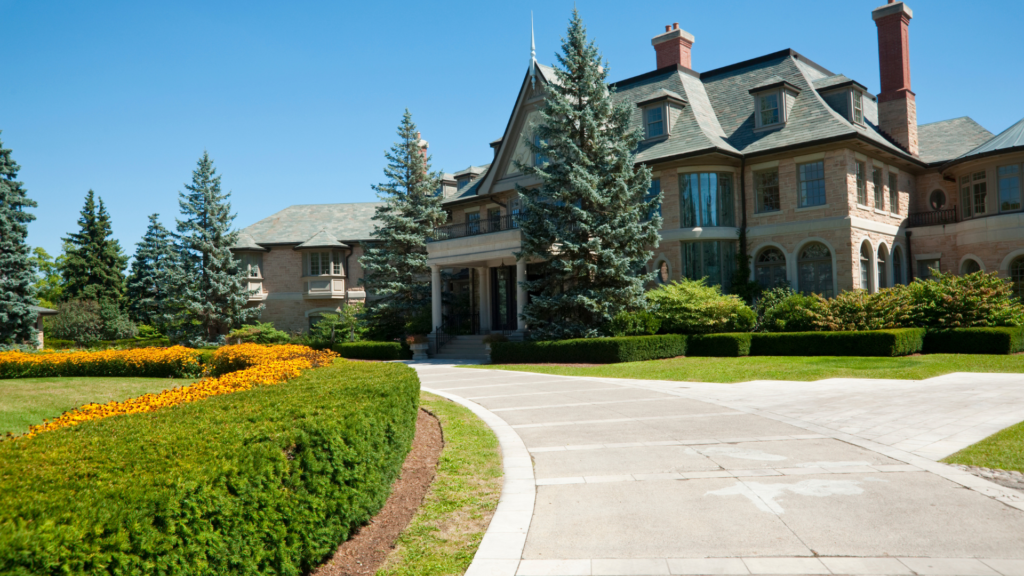
FAQs: About Driveway Ideas NZ
What are the most cost-effective driveway options for homes in New Zealand?
Gravel and asphalt are considered the most cost-effective driveway options for NZ homes. Gravel is affordable, easy to install, and works well for rural or coastal properties. Asphalt, while slightly more expensive, is durable, smooth, and suitable for large properties or urban areas.
Which driveway material is best suited for areas with heavy rainfall in New Zealand?
For areas with heavy rainfall, permeable driveways or gravel driveways are ideal. Permeable driveways allow water to drain through the surface, reducing runoff and preventing flooding. Gravel also promotes natural drainage and helps prevent water pooling.
Are resin-bound driveways a good option for New Zealand’s varying climates?
Yes, resin-bound driveways are a good choice for New Zealand’s variable weather, as they are durable and permeable. They are resistant to cracking and perform well in both hot and cold climates, making them a versatile option for NZ homes.
What type of driveway works best for homes with a modern design?
Concrete driveways, especially those with stamped or polished finishes, work well with modern homes. Resin-bound driveways and mixed-material designs also offer contemporary, sleek appearances that complement modern architectural styles.
What maintenance is required for a gravel driveway?
Gravel driveways require occasional maintenance, including raking to smooth out displaced gravel and adding more gravel over time as it gets compacted or scattered. Weed control is also important to maintain the driveway’s appearance and function.
Can I install a cobblestone driveway on a sloped surface?
Yes, cobblestone driveways can be installed on a sloped surface, but it’s important to ensure proper drainage and a strong foundation to prevent stones from shifting. Cobblestones provide excellent grip and durability, making them a good option for sloped driveways.
How long does a concrete driveway typically last in New Zealand?
A well-installed and maintained concrete driveway can last 25-30 years or more in New Zealand. Regular sealing and addressing cracks early will help extend its lifespan, especially in areas with significant temperature fluctuations or heavy use.
What are the benefits of using mixed materials in a driveway design?
Mixed-material driveways offer flexibility in design, combining the strengths of different materials to create a unique and functional space. For example, combining concrete with gravel or pavers can enhance aesthetic appeal, improve drainage, and reduce costs by using expensive materials sparingly.
What driveway material is most eco-friendly for NZ homeowners?
Permeable driveways and grass pavers are among the most eco-friendly options. Permeable surfaces allow water to drain naturally into the ground, reducing stormwater runoff. Grass pavers use reinforced grids that let grass grow through, providing a green and natural look that’s sustainable.
How can I make my driveway more visually appealing without spending too much?
For a budget-friendly upgrade, consider edging your driveway with bricks, stones, or plants to create defined borders. Gravel driveways with decorative edging or adding a simple stamped concrete finish can enhance curb appeal without significantly increasing costs.
Conclusion
The range of driveway ideas discussed offers homeowners plenty of options to enhance the overall appearance and functionality of their property. From traditional materials like concrete and gravel to more unique choices such as brick, cobblestone, or permeable pavers, there’s a solution for every type of home, location, and climate. It’s crucial to choose a driveway that not only complements the aesthetic appeal of the home but also meets practical considerations like durability, maintenance, and weather resistance. Whether you’re looking to make a bold statement with a modern design or prioritize eco-friendliness and low upkeep, considering both form and function will ensure a successful outcome. If you’re still unsure about the best choice, don’t hesitate to explore options or seek advice tailored to your specific needs. We invite you to share your favorite driveway ideas or ask any questions about which solution might work best for you.
About the Author:
Mike Veail is a recognized digital marketing expert with over 6 years of experience in helping tradespeople and small businesses thrive online. A former quantity surveyor, Mike combines deep industry knowledge with hands-on expertise in SEO and Google Ads. His marketing strategies are tailored to the specific needs of the trades sector, helping businesses increase visibility and generate more leads through proven, ethical methods.
Mike has successfully partnered with numerous companies, establishing a track record of delivering measurable results. His work has been featured across various platforms that showcase his expertise in lead generation and online marketing for the trades sector.
Learn more about Mike's experience and services at https://theleadguy.online or follow him on social media:




